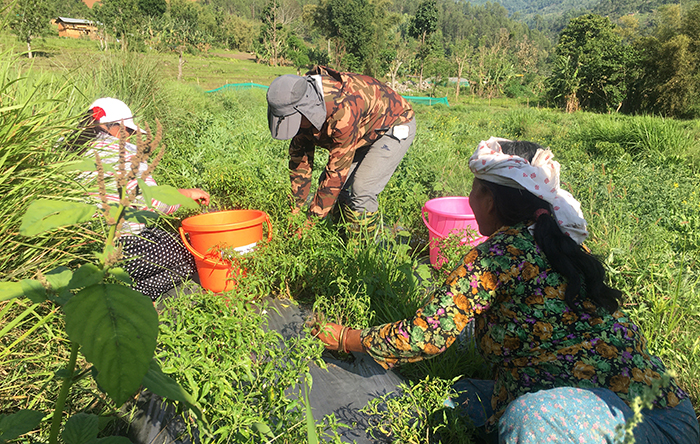Chimi Dema | Sergithang
Three weeks ago, villages in Sergithang gewog were flooded with vegetable suppliers and vendors rushing to buy every hanging chilli in their fields. Some suppliers even paid advance to villagers buying up entire fields of chillies.
Rudra Lal Sanyasi, a young farmer in the gewog, was inspired by the huge surge in demand.
Vegetable vendors from as far as in Thimphu, Punakha and Wangdue made numerous calls to local farmers almost every day, asking for chillies, Rudra Lal Sanyasi said.
“We were happy and motivated to grow even more,” he said. “But not anymore.”
Villagers today said the status has changed adversely.
With local chilli demand falling fast, farmers are worried that they might not be able to recover their investment.
Rudra Lal Sanyasi said that the same variety of chilli, which was earlier sold at Nu 300 for a kilogramme (kg) at the farm cannot fetch even Nu 200 a kg now.
“There is no demand,” he said.
“It’s harvest time soon for my chillies and I am expecting more than 100kg but I’ve nowhere to sell.”
Given the long distance between the gewog and the dzongkhag’s main vegetable market in Damphu, farmers said that it is not profitable to take it there.
“Without a private vehicle, it does not make sense to take small quantities to the market, because the transportation cost is huge,” a farmer said.
“Actually, we are at loss if the cost falls below Nu 300 for a kg considering the cost of production and labour charges we had to bear.”
Another farmer, Sanman Subba said although market accessibility is not a problem for him, the chilli prices in the market worries him.
Sanman Subba mainly supplies to Bajo town in Wangdue, and sometimes to Punakha and Thimphu.
He said that he also used to receive supply order of around 60kg from vendors, a few weeks ago. “I don’t receive anymore.”
The gewog’s agriculture extension officer, DB Ghalley said that following the lock-down in India and closing of borders in the light of Covid-19 pandemic, there was a huge demand for local chillies.
However, he said that recently the demand has decreased drastically.
“I also heard that few farmers supplying to Wangdue and Thimphu are struggling to find sale,” he said.
DB Ghalley said that farmers have approached his office seeking suggestion for market accessibility.
If they produce around a metric tonne, the Department of Agriculture Marketing and Cooperatives could help, he said. “But as each farmer produces only less than a 100kg at a time, it is inconvenient to arrange transportation.”
Farmers suspect that availability of imported chillies is affecting the demand for their chillies.
“The vendors said that chillies from India are now available when being asked for why they did not come to buy from us anymore,” a farmer said.
Farmers said soon they would revert back to growing only for their own consumption if the trend continues because it is demotivating.
“In the past, some vendors have also come to ask for a few kgs of chillies, saying that they wanted to mix with those brought from across the border and sell,” another farmer said.
About 20 households in Sergithang grow chilli on about eight-acre land including five who cultivate early big chilli.
The local vendors say that suppliers come with a permit slip and they cannot question them further as it appears legal.
Meanwhile, the small chillies available at the weekend market in Damphu were sold as local and charged as high as Nu 350 a kg.


